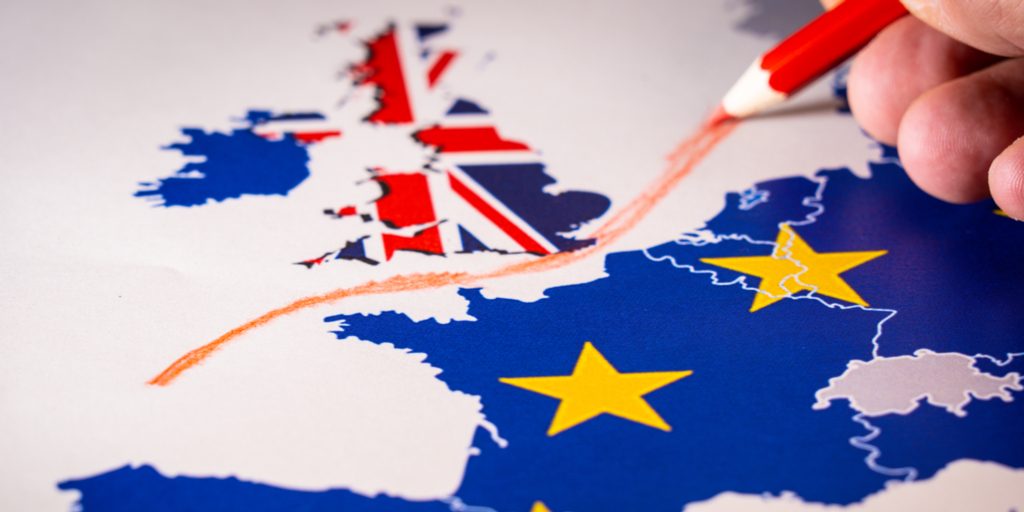No longer a stealth project, the EU superstate is openly declared. Inside and outside its frontiers, its goal is hegemony.
A No-Deal Brexit: Probable Disaster or Potential Opportunity?
At 11 pm GMT on 29 March 2019, the United Kingdom of Great Britain and Northern Ireland is scheduled to leave the European Union. Regardless of what position people took during the 2016 Brexit referendum, this leaving could be viewed as an once-in-a-lifetime opportunity for a sovereign nation-state to engage in a major reset of its political, economic, and legal relationships.
That, however, is not how most of the British political class sees Brexit. As in the lead-up to the referendum, gloom-and-doom is being voiced from across the political spectrum at Westminster. This owes something to the fact that Prime Minister Theresa May’s tenuous hold on the House of Commons—not to mention her own Tory party—means that her government has to negotiate with multiple groups with wildly divergent views of what Brexit should be or if it should even occur. To say that this process has not been going well is an understatement. It’s further complicated by the fact that many government ministers and MPs from all parties, the majority of the civil service and large segments of the press opposed Brexit, have never accepted the referendum result, and resent the entire exercise.
It’s an open question whether Britain and the EU will have ratified a formal withdrawal treaty before March 29. Theoretically the EU could prolong the two-year negotiation period. That, however, requires agreement from all of the remaining 27 EU member-states. This is only likely if negotiations indicate that (1) an agreement is probable and (2) it will be affirmed by all 27 member-states and Britain’s Parliament.
Without a treaty, Britain is heading for a No-Deal Brexit. Not surprisingly, many people inside and outside the UK want to know what that would portend for Britain. Would it mean economic upheaval, even a breakdown in civil order? Or would people wonder on March 30 what the fuss was all about?
A New Economic World
Most discussion about Brexit concerns its economic implications. Should a No-Deal Brexit occur, Britain’s trade relationship with the EU will be governed by World Trade Organization (WTO) rules after March 29. These rules already determine how Britain trades with countries like Brazil, China, and America. At present, Britain anticipates adopting the same tariff schedules under which they have operated as part of the EU. The hope is to minimize disruption and uncertainty for British and foreign businesses.
This doesn’t mean that Britain would need to sit still after March 29. A No-Deal Brexit would be an occasion for Britain to reassess its trade relationship with every country with whom it has significant economic relations. Freed from the obligations associated with any pre-existing trading commitment to the EU, Britain would be at liberty to pursue new trade agreements and possibly secure more advantageous terms than either WTO rules or the tariff schedules hitherto negotiated on Britain’s behalf by the EU.
Trade deals don’t happen overnight. Some are years in the making. Nevertheless, few nations have the chance to engage in this type of systematic reassessment. We also know that many countries are very ready to do trade deals with Britain. The United States and Australia, for instance, have consistently signaled an anxiousness to negotiate more favorable trade agreements with the UK as soon as possible.
Nor should we assume that the EU would try to freeze Britain out. No doubt, some Brussels officials want to punish Britain for leaving the EU, mainly, I suspect, to send a message to other member-states tempted to exit in the near or distant future. That said, the German and French business communities wouldn’t sit idle while other nations secured advantageous trade agreements with what is, after all, the world’s fifth-largest economy in nominal GDP. It’s hard to believe that European business lobbies wouldn’t press their governments and Brussels to secure new trade arrangements with Britain. Economic self-interest has a way of trumping political resentment.
Courts, Immigration, and Borders
While future economic scenarios receive the most attention in speculating what a No-Deal Brexit might look like, the impact could be equally consequential in many other areas. Britain would, for instance, no longer be subject to rulings issued by EU legal institutions like the European Court of Human Rights (ECHR). That would require Parliament to revisit a number of matters such as the workings of human rights law in Britain post-March 29.
A No-Deal Brexit would also mean that the fundamental principles which have been central to the European unification project since the 1958 Treaty of Rome—specifically, the free movement of goods, services, capital and people between EU member-states—would no longer apply between the UK and the EU. That has major implications for the subject which animated many of the people who voted for Brexit in 2016.
There’s little question that one reason for the pro-Brexit victory in 2016 was the sense that the EU had not only lost control of its borders but that many continental European politicians simply didn’t care about porous borders. Many found this thesis confirmed by Angela Merkel’s 2015 unilateral decision to accept over a million Middle-Eastern migrants into Germany and thus, potentially, into every other EU member-state. If there was a single event which provided a decisive reason for many people to vote for Brexit, this was it.
A No-Deal Brexit would fully restore Britain’s borders vis-à-vis all EU member-states. Like any sovereign-nation, Britain would decide who does and doesn’t enter the UK. Britain would thus be better shielded from the effects of decisions about immigration policy made in Berlin, Paris or Brussels.
But many complications would also arise from a full-scale restoration of borders vis-à-vis the EU. It’s been suggested, for instance, that the greater cooperation between Northern Ireland and the Irish Republic entailed by the 1998 Good Friday Agreement relies heavily on softening the 310-mile border between the two. A hardened border between the North and the Republic after 29 March would, the Irish government claims, put the agreement in jeopardy.
Britain would, I suspect, seek to address this by negotiating a soft customs border with Ireland. A related and broader question is how a No-Deal Brexit would affect ease of travel for British nationals going to EU countries, and for EU citizens wanting to visit the UK. Again, it’s likely that Britain would enter into negotiations with each EU government to settle new visa arrangements.
A more difficult issue concerns the 3.2 million EU nationals who live in Britain, and the approximately 1.3 million British citizens resident in the EU. Britain has said that, whatever happens, it will protect EU citizens who are full-time residents in the UK on March 29. These people will be eligible to apply to settle in the UK permanently along with immediate family members. After March 29, however, citizens of EU member-states won’t have an automatic right to live and work in the UK. Like people from any other country, they won’t be able to work, reside or study in Britain for more than three months unless they receive permission to stay.
The flip-side to this is that a No-Deal Brexit would leave British nationals living in EU member-states having to navigate very different residency rules depending upon the EU country in which they are living. Moreover, the status of all sorts of reciprocal arrangements concerning matters ranging from healthcare to social security which presently exist between Britain and the EU would, at a minimum, be very unclear. Some EU governments have said that they will take emergency measures to address the situation of UK citizens living and working in their countries. Precisely how that would play out is anyone’s guess.
More positively, Britain would be free to create an entirely new migration regime after a No-Deal Brexit. Given the particular sensitivities always associated with migration, not many countries get the chance to recast migration policy. Britain, however, would have an opening to think about migration creatively. It could, for instance, opt for skills-based immigration programs similar to those of Canada or Australia. Britain could even decide to accord preferential treatment to citizens of Anglosphere nations. In short, Britain would be in a position to rethink every aspect of immigration policy in terms of what programs would best serve its national interests.
Taking Sovereignty Seriously
And that points towards what would be perhaps the most important outcome of a No-Deal Brexit. Should that occur, Britain will find itself suddenly facing up to all the realities associated with being a sovereign nation-state. In a way, sovereignty is what Brexit was ultimately about.
While the European integration project has always had a strong economic emphasis, the focus has shifted decisively over the past thirty years towards replacing national sovereignty in favor of a European supranational state. Figures such as Merkel, EU Commission President Jean-Claude Juncker and the former Belgian prime minister and current MEP Guy Verhofstadt do not disguise this ambition. A common criticism of the various schemes for implementing Brexit floated by Theresa May’s government over the past two-and-a-half years and the proposed deal rejected by Parliament in January is that they involved concessions to the EU which would have left Britain entangled in this project. What’s the point of Brexit, many ask, if Britain isn’t fully free to make its own decisions about matters ranging from trade to immigration after March 29?
No sovereign nation-state is a metaphorical island. No nation-state can literally do whatever it wants, not least because it immediately encounters the reality that other nation-states are also pursuing their own interests. Negotiations, treaties, and give-and-take between states in international affairs are inescapable.
But if anything is implied by a No-Deal Brexit, it is this: the British government would suddenly find that the prime responsibility for many policy-decisions gradually ceded to EU institutions since Britain entered the European Economic Community in 1973 unequivocally belongs to British institutions ranging from the legal systems of England and Scotland to Parliament itself.
In other words, Britain would be facing the prospect of full self-government, with all the freedom and accountability which goes along with this. A No-Deal Brexit would tell us just how many Britain’s political leaders are willing, let alone able, to fulfill this responsibility.



